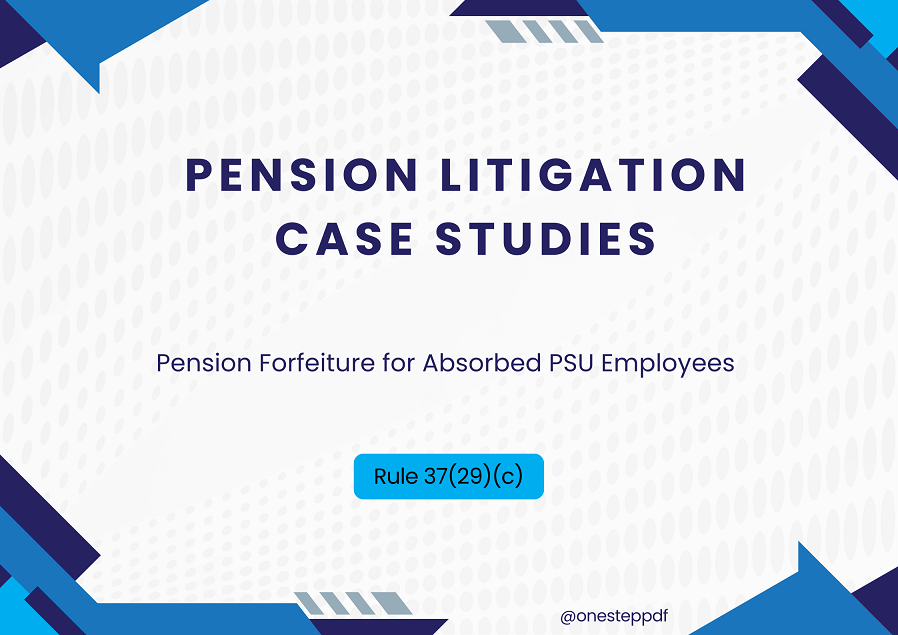| PDF Title | Pension Litigation Case Study – Pension Forfeiture for Absorbed PSU Employees – Rule 37(29)(c) |
| Category | |
| Order no | Rule 37(29)(c) |
| Posted By | Admin |
| Posted On | Aug 18, 2025 |

Get PDF in One step
| PDF Title | Pension Litigation Case Study – Pension Forfeiture for Absorbed PSU Employees – Rule 37(29)(c) |
| Category | |
| Order no | Rule 37(29)(c) |
| Posted By | Admin |
| Posted On | Aug 18, 2025 |

3. Pension Forfeiture for Absorbed PSU Employees– A Deep Dive into Rule 37(29)(c) and the Hon’ble Supreme Court’s Stance
3.1 The question of pension entitlements for Government employees, who transitioned to Public Sector Undertakings (PSUs) has long been a complex one, especially when misconduct leads to dismissal. At the heart of this intricate issue lies Rule 37(29)(c) of the Central Civil Services (Pension) Rules, 2021 (formerly Rule 37-A (25c) of CCS (Pension) Rules, 1972).
The Core Conflict: Pension Protection Versus Disciplinary Action
3.2 The fundamental tension arose from conflicting provisions governing pension benefits. For Central Government employees, the rules are unambiguous: dismissal or removal from service results in the forfeiture of all past service and pensionary benefits under Rule 41(1) of CCS (Pension) Rules, 2021. However, Rule 37(29)(c) for absorbed PSU employees stipulated that “the dismissal or removal from service of the Public Sector Undertaking of any employee after his absorption in such undertaking for any subsequent misconduct shall not amount to forfeiture of the retirement benefits for the service rendered under the Government.” This rule also mandated that the PSU’s decision on dismissal, removal, or retrenchment would be subject to review by the concerned administrative Ministry, in this instance, DoT.
3.3 Prior to the recent Hon’ble Supreme Court judgement, this provision often led to a scenario where absorbed employees, even those dismissed from PSUs for severe misconduct or criminal convictions, successfully claimed pension for their prior Government service. This created a notable disparity; a Government employee in an identical situation would typically lose all pensionary rights. This “better benefit” for absorbed employees became a point of contention for DoT, especially considering that the pension liability for both Government and PSU service is borne entirely by the Government.
3.4 The Landmark Decision: Suraj Pratap Singh Vs CMD BSNL & Ors.
The pivotal case that brought this contentious issue into sharp focus was SLP No. 4817/2020, titled Suraj Pratap Singh Vs CMD BSNL & Ors. This case ultimately provided much-needed clarity on the interpretation of Rule 37(29)(c).
3.5 Background of Shri Suraj Pratap Singh’s Case:
Shri Suraj Pratap Singh began his career as a Junior Engineer in the Department of Telecommunications (DoT) in 1977. He was later absorbed into BSNL and retired on superannuation on December 31, 2008. Crucially, before his retirement, on April 1, 2008, he was apprehended by the CBI for accepting a bribe. Following due judicial process, he was convicted on September 20, 2012, under the Prevention of Corruption Act, 1988, and sentenced to two years’ imprisonment.
3.6 The Legal Journey and Evolving Interpretations:
3.7 DoT’s Proposal for Review:
Empowered by the Hon’ble Supreme Court’s clear pronouncement that absorbed employees should not receive a “better benefit” than their Government counterparts, DoT formally proposed a comprehensive review of Rule 37(29)(c) of the CCS (Pension) Rules, 2021, following a significant Hon’ble Supreme Court judgment in the Suraj Pratap Singh case on January 9, 2023. This ruling clarified that absorbed PSU employees should not receive “better benefits” than their Central Government counterparts, specifically addressing the anomaly where absorbed employees dismissed for criminal misconduct were still granted pension for their prior government service. DoT argues that the previous interpretation of this rule provided undue “blanket protection,” violated the fundamental right to equality by contradicting Rule 41 of the CCS (Pension) Rules, 2021, and potentially discouraged diligent employees. Consequently, DoT sought an amendment to ensure pension forfeiture for such employees aligns analogously with how it applies to direct Government servants, reflecting the Hon’ble Supreme Court’s emphasis on equitable treatment.
DoT specifically requested that the rule be amended to ensure it “does not confer a better benefit” upon an absorbed government servant in a PSU, aligning fully with the Hon’ble Supreme Court’s observation.
3.8 Resolution by DoPPW:
The proposal was considered deeply among five departments vis DLA, DOE, DOT, DOPT and DoPPW and finally on May 27, 2025, a PIB press release confirmed that Rule 37(29)(c) had been amended. This amendment explicitly states that dismissal from PSU service for misconduct shall lead to forfeiture of retirement benefits for the service rendered under the Government also. Furthermore, it clarifies that relevant provisions of Rules 7, 8, 41, and 44(5) (a)&(b) of the CCS (Pension) Rules, 2021, would apply analogously. This legislative action solidifies the Hon’ble Supreme Court’s interpretation, ensuring that the principle of equal treatment regarding pension forfeiture for misconduct now applies uniformly to both direct Government employees and those absorbed into PSUs. This amendment effectively addresses the long-standing disparity and brings consistency to the pension rules across these categories of employees.
3.9 In this regard, a Gazette Notification dated 23.05.2025 has also been issued.
Download PDF